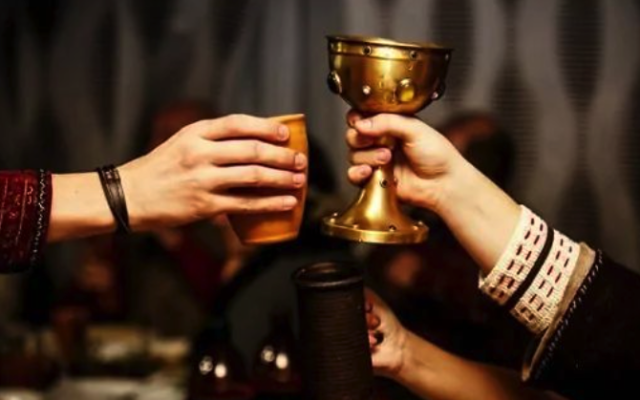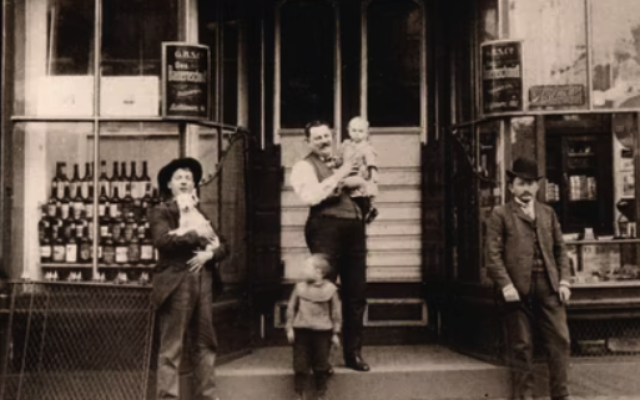Purim Brings Jews and Booze into Focus
Purim is one of the few occasions during which Jewish tradition seems to encourage drunkenness.
Rava said: It is one’s duty to make oneself fragrant [with wine] on Purim until one cannot tell the difference between cursed be Haman and blessed be Mordecai. (Babylonian Talmud, Megillah 7b)
According to most biblical commentators, this Talmudic injunction — to drink until we are unable to think straight during Purim — is one of the few times that Jewish tradition encourages drunkenness. At the same time, Rabbi David Golinkin, president of The Schechter Institutes in Israel, points out that the Hebrew scriptures, for the most part, come down solidly on the side of sobriety.
Writing in the Institute’s bulletin, Golinkin cited the disapproval surrounding Noah’s drunkenness in Genesis and Abraham’s nephew, Lot, who drinks too much after the destruction of Sodom. He also points to the sudden deaths, by divine fire, of Aaron’s sons, Nadav and Avihu, after they apparently become drunk and enter the Tabernacle in the wilderness of Sinai. Biblical commentary condemns drunkenness because it leads to forbidden sexual relations, Golinkin writes, as evidenced in the opinion of the Talmud that “there is nothing that causes a person greater lamentation than wine.”
Still, each Friday night we lift our kiddish cups and, on Passover, are instructed to drink four cups of wine, filled to the brim. On Purim, some Jews even lose consciousness after a long night of public revelry.
In “Jews and Booze: Becoming American in the Age of Prohibition,” Georgia State University history professor Marni Davis recounted the role that alcohol played in the economic life of Jewish immigrants from Germany and Eastern Europe in the 1880s.
In New York, for example, the brewery that produced the popular Rheingold Beer brand was owned by Jews, while thriving liquor industries were established in Cincinnati — birthplace of Reform Judaism in America— and in Louisville, where Jews produced and distributed Kentucky bourbon.

“The number of Jews who are involved in these distribution networks far outnumbers their percentage of the population,” says Davis. “So, in a city like Louisville, where Jews were perhaps two percent of the city’s total population, they would be something like a quarter of the entrepreneurs who were engaged in whiskey production and distribution.”
In 19th-century Eastern Europe, from which many Jewish immigrants came, brewing beer and hard liquor was big business. In Poland, major landholders among the Polish nobility reasoned that they could make more money selling their grain to alcohol producers than they could selling it to flour millers. Jews added to their reputation as shrew or astute businessman. They developed a leasing system known as propinacja, so-called propination laws, which gave their Jewish partners a monopoly over the liquor trade.
In “Yankel’s Tavern,” a historical study of the 19th-century Polish liquor trade, author Glenn Dynner estimates that some 30 to 40 percent of Poland’s Jews were involved in making or selling liquor.
Emperor Franz Joseph of the Austro-Hungarian empire gave the Jewish Herzog family the exclusive right to provide him with wine, while in Germany, Jewish brewers were leaders in the modernization of the beer industry. Economic lessons like these were not lost on Jewish emigrants, who found opportunities in America’s bourgeoning spirits industry.
Isaac Wolfe Bernheim, one of Louisville’s bourbon distillers, created a major brand that is still a big seller today, I. W. Harper. (The initials were said to stand for Isaac Wolfe.) Bernheim was a prominent supporter of the American Jewish Committee and of the Reform movement in America who underwrote the movement’s first library at Hebrew Union College.
According to Davis, the end of prohibition in 1933 also meant the end of the stigma that had clung to the liquor industry and its Jews. Who was producing alcohol became a question of very little importance in American society.
At the outset of World War II, Alfred Davis established his National Distributing Company in Atlanta, today part of one of the major alcoholic beverage distributors in America. The Davis Academy, the largest Reform day school in America, is named in honor of Davis and his wife.
Still, controversies surrounding how alcohol is consumed — which kind, in which quantity and setting — linger on. They come into focus especially when, each year, we celebrate the redemption of the Jews of Persia.
Organizations as diverse as Chabad and The Blue Dove Foundation in Atlanta have made it part of their message to drink responsibly during the Purim holiday. In the time she spent writing her history of Jews and alcohol in America, Davis feels that she has learned an important principle.
“It isn’t just about alcohol. It’s about morality,” she says. “It’s about fears of people behaving in ways that are regarded as outside of proper comportment. And when those understandings of proper comportment are also sort of attached to national identity, that gets even more complicated.”
- Holiday Flavors
- Community
- Bob Bahr
- Purim
- Rabbi David Golinkin
- The Schechter Institutes
- Israel
- Noah
- drunk
- booze
- Alcohol
- Genesis
- Abraham
- Lot
- Sodom
- Aaron
- Nadav
- Avihu
- Tabernacle
- Sinai
- kiddish
- Passover
- Pesach
- Seder
- wine
- Jews and Booze
- Georgia state university
- Marni Davis
- whiskey
- Kentucky bourbon
- Yankel's Tavern
- Glenn Dynner
- Isaac Wolfe Bernheim
- hebrew union college
- Alfred Davis
- The Davis Academy
- Chabad
- Blue Dove Foundation




comments